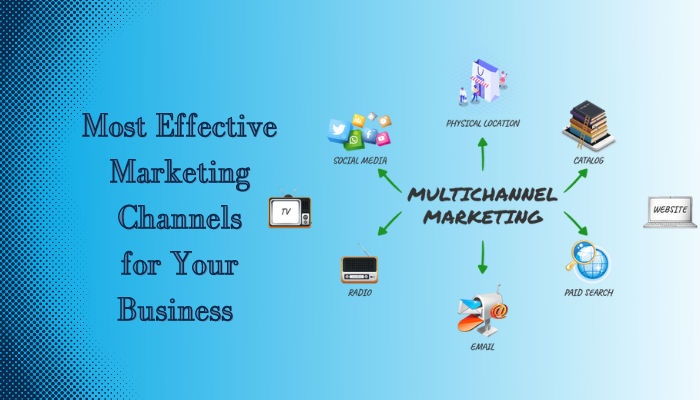Marketers can reach their customers in more ways than ever now. Marketing Channels have spread out across the digital and print world. With just a Spectrum internet cable connection and a smartphone, you can devise effective digital marketing strategies. With so many options, marketing personnel can get overwhelmed though. It can be a task to select the marketing channel that may work best for your business. This article will discuss the right approach to direct your focus for the best results.
If you are a small business, you don’t have to select the flashiest product. Most of the time, it all depends on your strategy. You do not need to spend money on all marketing channels to make a difference. Instead, focusing on the right channels counts more. The best way is to know what resonates more with your target audience. You should know where to spend your time and money to make the most impact
Popular Marketing Channels
Before you decide which channel will work for you, it is important to know your options. This list should not be seen as exhaustive as it barely scratches the surface. Here are some of the most commonly used marketing channels:
- Print Media
- Search Engine Optimization (SEO)
- Email Marketing
- Pay-Per-Click (PPC)
- Display Advertising
- Social Media Marketing (SMM)
- Content Marketing
- Affiliate Marketing
- Influencer Marketing
- Public Relations (PR)
The list can be further broken down into more categories. For instance, there are different social media channels such as Facebook, Twitter, etc. And print media have different mediums as well such as newspapers and magazines. Therefore, it is important to know the best marketing channels for you.
Tips for Selecting the Right Marketing Channel
You should not be feeling around in the dark when it comes to your business marketing strategy. Here are some important considerations before choosing a marketing channel:
#1: List Your Goals
Your marketing strategy should always have a clear distinct goal. You should know what you want to achieve from the campaign before you design it. Some of the primary goals your marketing campaign can focus on are:
- Best lead generation tool
- Creating brand awareness
- Boost sales
- Remarketing your products
- Touch base with existing customers
So, the choice of your marketing channel can greatly depend upon your marketing goals. You need to be clear about what you want to focus your campaign around. Then decide where you want to place your ads. Clear goals can be the foundation of an effective marketing strategy
Each and every marketing channel has its own strengths and weaknesses. For instance, if you want to increase sales Facebook storefronts might work better for you. On the other hand, PPC is a great option for lead generation. If you know your goals, you are more likely to pick the right marketing channel for you.
#2: Know Your Audience
If you do not understand who your target audience is, you cannot develop the right marketing strategy. A good marketer should know the demographics of their audience. This includes their age, gender, likes, and geographical location. Moreover, important things to know can include their most visited websites and recent Google searches.
If your audience spends a lot of time on social media, you should choose SMM. Furthermore, if you know which social media website is most common with your audience you have hit the jackpot. The choice for the most effective marketing medium can thus depend on your audience. If you ignore your target audience, you might be performing in front of an empty theatre.
#3: Know Your Competition
Devising the best marketing strategy also includes knowing your competition. You don’t have to go James Bond on them, but you need to know their strategies. If you want to select the right marketing channel, observing ads from your competition can be good practice. If your competition is focusing on one channel, you cannot exclude yourself from it. It will be like forfeiting the most important game of the tournament.
What your competition does or plans to do can force you to modify your plans as well. It is important to know this beforehand, so you don’t get blindsided by it later. Sometimes, scoping out your competition can also give you some direction if you are confused. Whatever is working for your immediate competitor has a high chance of working for you as well.
#4: Define Your Budget
One of the most important factors for any marketing campaign is your budget. It will be logical to know your budgeting shortcomings before allocating money to various marketing channels. If you have just enough money to focus on one medium, be reasonable and do just that. Stretching the budget out thin across various channels is probably not wise. Instead, focus on the most effective channel and take full advantage of it.
Knowing your budget beforehand can also help you stay on top of things and organize well. You already know how much money you can spend on each ad campaign. So, it is better to design something that will work best within the budget. For instance, if you can’t afford to run an ad on television, there is no point in coming up with a TVC script or concept story. Moreover, running video-based ads might require more budget than picture media.
#5: Focus on the Type of Content
When you know your audience, your goals and your preferred social media outlet, the next natural step is to generate content. All this knowledge can be a great way to understand what type of content will resonate most with your audience. For example, your audience is between the ages of 16 and 25 and uses TikTok the most. Then, your content should primarily be short-form videos that are crisp and give the most important information in the first minute of the video.
The best content is the one that answers questions and focuses on solving problems. So, whatever you end up doing, make sure that it adds value to your prospective customer’s life.
Final Words
Marketing doesn’t have to be a shot in the dark. If you focus on your audience, your strengths, and your unique selling point, then most of your campaigns can be successful.







